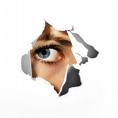
Clearing MSN Explorer's search history depends on the browser you are using. The search history entries are part of the browser's autocomplete feature where the browser will semi-intelligently guess or provide best guesses for your search terms based on the first few letters you type, thus the term autocomplete. The thing is the autocomplete function doesn't just guess, it saves the information that you enter in your search bar. Here are ways to clear your MSN Explorer search history based on your browser.
Internet Explorer
If you are using Internet Explorer version 6.0 or higher:
1. Select the Tools menu in Internet Explorer.
2. Select Internet Options then select the Content tab.
3. Under AutoComplete, click on the Settings button.
4. Within Use AutoComplete For remove the check from the Forms checkbox to permanently stop the generation of search history.
5. Click OK.
From here you can click the Clear Forms box to delete your current history, or you can uncheck the Forms box to permanently stop the generation of search history.
Mozilla Firefox
If you are using Mozilla Firefox versions 2.x, please follow these steps:
1. Select the Tools menu.
2. Select Options.
3. Click the Privacy icon.
4. Select Saved Form Information, deselect the Save information I enter in web page forms and the Search Bar box.
5. Click OK.
If you are using Mozilla Firefox versions 3.x, please follow these steps:
1. Select the Tools menu.
2. Select Options.
3. Select Never Remember History from the Firefox will dropdown menu.
4. Click OK.
This will remove the stored searches as well as prevent the storage of new search terms.
Safari Browser
To disable the AutoFill feature on Safari:
1. Click Preferences from the Safari menu.
2. Deselect the AutoFill button.
Yahoo! Toolbar Search History
Instructions for clearing the search history within Yahoo! Toolbar will depend on which web browser as well as which version of the Yahoo! Toolbar you are using. To access the Yahoo! Toolbar settings, you will either click the pencil icon or the Settings tab in your Yahoo! Toolbar.
Internet Explorer
If you want to remove all the entries in your Yahoo! Toolbar search history, but you still want Yahoo! Toolbar to remember your searches in the future, follow these steps:
1. Click the Settings tab or Pencil icon to see the settings menu.
2. Select Clear Recent Searches.
If you want to save your recent searches while you're searching on the Web, but automatically clear the saved searches when you close your browser window:
1. Click the Settings tab or Pencil icon to see the settings menu.
2. Select Yahoo! Toolbar Options.
3. Select Auto-clear recent searches when exiting IE by putting a checkmark in the box next to it.
4. Click OK.
If you want to disable the feature in Yahoo! Toolbar entirely so that none of your searches are saved, do the following:
1. Click the Settings tab or Pencil icon to see the settings menu.
2. Select Toolbar Options.
3. Click Remember Recent Searches so that there is not a checkmark in the box next to it.
4. Click OK.
Mozilla Firefox
If you want to remove all the entries in your Yahoo! Toolbar search history, but you still want Yahoo! Toolbar to remember your searches in the future, follow these steps:
1. Click the Settings tab or Pencil icon to see the settings menu.
2. Select Clear Recent Searches.
If you want to save your recent searches while you're searching on the Web, but automatically clear the saved searches when you close your browser window:
1. Click the Settings tab or Pencil icon to see the settings menu.
2. Select Yahoo! Toolbar Options.
3. Select Auto-clear recent searches when exiting Firefox by putting a checkmark in the box next to it.
4. Click OK.
At this time, the Mozilla Firefox version of the Yahoo! Toolbar does not offer the option to disable the feature so that none of your searches are saved. There are great software available commercially though that will help you remove search history automatically. All you need to do is look for
internet privacy software,
internet cleaners, internet erasers, history cleaners, history erasers, tracks erasers and tracks cleaners like
Winclear.











